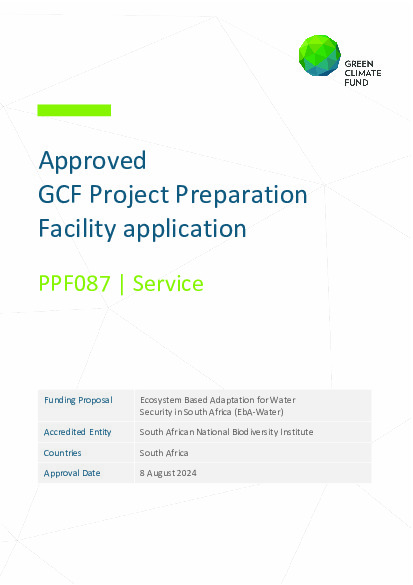Ecosystem Based Adaptation for Water Security in South Africa (EbA-Water)

Ecosystem Based Adaptation for Water Security in South Africa (EbA-Water)
South Africa is a water-scarce country facing an escalating water crisis due to climate change. Diminishing water security has negative impacts on economic growth and human well-being. South Africa has identified 22 Strategic Water Source Areas (SWSAs, also known as Water Towers) which collectively cover 10% of the land but provide 50% of the water supply. The project aims to directly improve the security1 of 11 of these SWSAs, and indirectly improve the security of the balance, through a suite of complementary measures, including ecological measures (Ecosystem-based Adaptation measures), legislative and regulatory measures, governance and coordination measures, financial measures as well as the establishment of effective monitoring and risk management capability.
South Africa’s mean annual rainfall is only half of the global average and water demand is expected to exceed supply by 2025. Furthermore, South Africa has an exceptionally variable climate, linked to ENSO events, with runs of above average rainfall years as well as prolonged multi-year droughts. Climate projections are for a significant drying in the west and south-west, but projections for the eastern escarpment have lower consensus. Water provision in drought periods is already critical and anticipated to worsen with climate change to which South Africa is especially vulnerable. Primary challenges posed by climate change include those related to water resource availability, reducing precipitation for most areas, increased evapotranspiration, and increasing population demands.
South Africa’s mean annual temperatures have increased by more than twice the global average from 1960-2010, and even if climate change is limited to a moderate 2o increase, this would represent a 4o increase for much of the country. There is high consensus in climate models that combined impact of precipitation and temperature will be increased soil aridity across the entire country as increasing temperatures exacerbate water loss through higher evapotranspiration. There have been documented changes in interannual rainfall variability and mean annual rainfall across the country. The number of rain days has decreased, implying increasingly intense rainfall events and longer dry spells, which are expected to increase further by 2050. Projected climate change impacts will result in less allocatable water in rivers, thereby increasing pressure on South Africa’s already water- stressed economy.
The proposed project will adopt a risk-informed approach to Integrated Water Resource Management (IWRM) that advances adaptive capacity by appraising climate risks and fostering Ecosystem-based Approaches to address climate change vulnerabilities and impacts.
The project Concept Note was initially submitted to the GCF through the Simplified Approval Process window in October 2020, and after four revisions to respond to comments from the GCF, was endorsed in July 2023. The South African National Biodiversity Institute (SANBI) was invited to submit a draft PPF request with the final revision of the Concept Note.